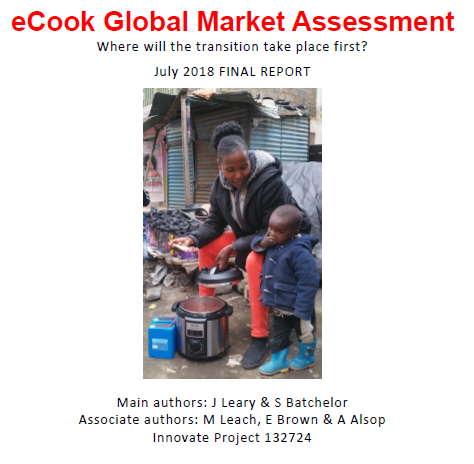 The aim of the global study is to support a strategic long-term mix of interventions that seek to pre-position research and knowledge such that when the pricing of components and systems reaches viability, donors, investors, the private sector and civil society can take rapidly eCook to scale.
The aim of the global study is to support a strategic long-term mix of interventions that seek to pre-position research and knowledge such that when the pricing of components and systems reaches viability, donors, investors, the private sector and civil society can take rapidly eCook to scale.
As you know from the rest of this site, the rapid spread of PV across Africa and Asia has already transformed millions of lives and is attracting considerable analytical attention. However, it has yet to have an impact on the main energy need of poor households: cooking. Dependence upon traditional cooking methods comes at significant cost, including health risks from smoke inhalation, economic burdens from high fuel expenditures and the environmental implications of carbon emissions and deforestation/forest degradation. Improved Cookstoves (ICS) and modern cooking fuels, have sought to address this problem, but by 2010, the uptake of clean cooking solutions remained as low as 10% in Sub-Saharan Africa (ESMAP & GACC 2015).
However, in the context of falling global PV prices, recent advancements in battery technology and rising charcoal/fuelwood prices in severely deforested regions open the door for a potentially transformative alternative – eCook (Batchelor 2013; Brown & Sumanik-Leary 2015, Leach and Oduro 2015, Slade 2015, Batchelor 2015a, Batchelor 2015b). In its most fundamental form, eCook consists of a cooking device paired with appropriately sized battery storage, which can either be charged directly from PV panels (PV-eCook) or from an unreliable grid (Grid-eCook).
The speed and degree to which this concept is taken up is expected to vary widely across the myriad culturally and physically diverse Global South contexts, however its potential impact is considerable. The new GMA report presents a structured analysis of a wide variety of socio-cultural, political, technical and economic factors which are expected to affect the uptake and potential impact of eCook across a variety of developing country contexts.
Firstly, a series of indicators were defined around the key strengths and weaknesses of eCook and three focus fuels: kerosene, charcoal and LPG. National level statistics representing each of these indicators were assembled into a database, which is available from PV-eCook.org as an open-access resource. Multi-Criteria Decision Analysis (MCDA) techniques were employed to evaluate the viability of eCook in each country context, as well as the size and attractiveness of the key target market segments. Finally, 16 of the 144 countries included in the MCDA were shortlisted and their unique market dynamics were explored in detail.
The objectives of the study are to locate, quantify and characterise the market for eCook in each country.
To do this the report and the accompanying open access database:
- Defines a series of indicators to represent the key contextual factors that are likely to have greatest influence on the viability of eCook.
- Assembles an open-access database (available from PV-eCook.org) with national level statistics for each indicator.
- Uses MCDA techniques to evaluate the viability of eCook in each country context.
- Identifies, quantifies and evaluates the attractiveness of the key target market segments.
- Explores the market dynamics of 16 shortlisted countries and recommends appropriate marketing strategies.
The Innovate project that this report is an output of was
Implemented by:

and Funded by
